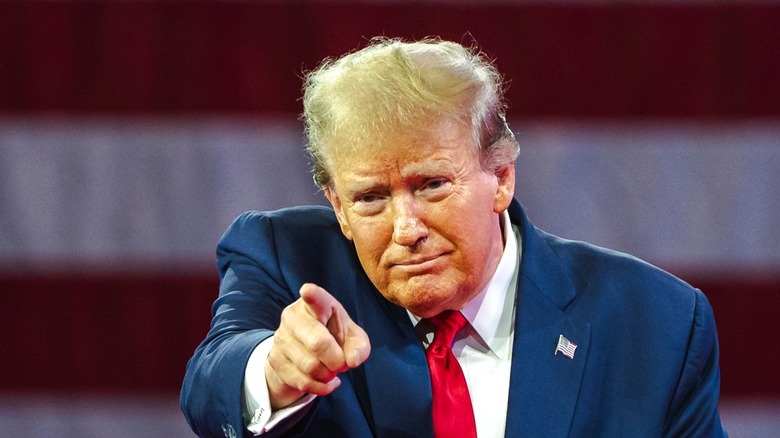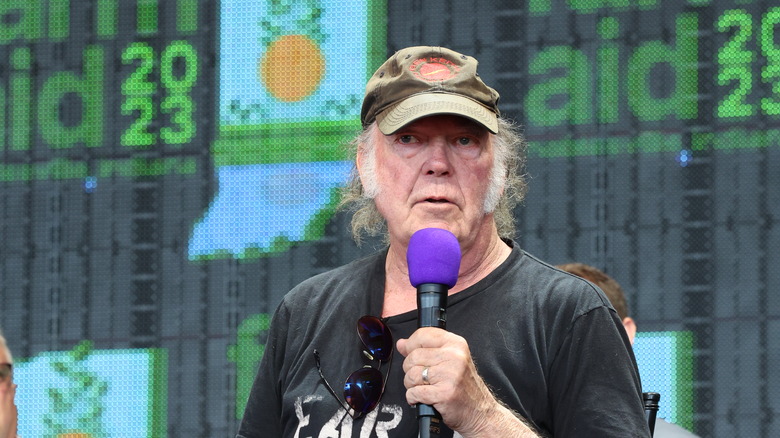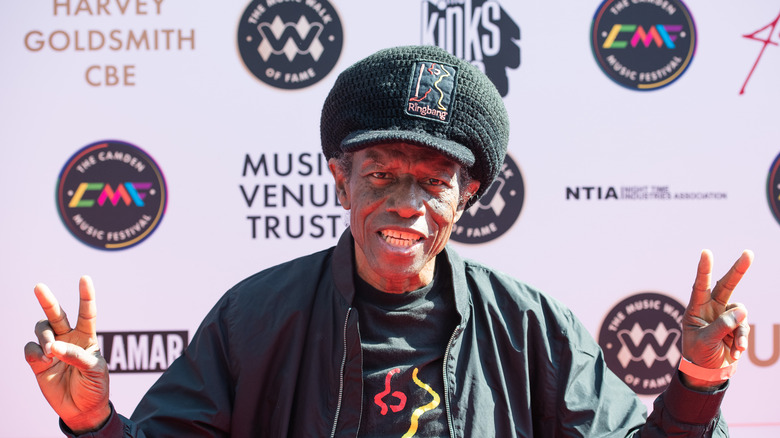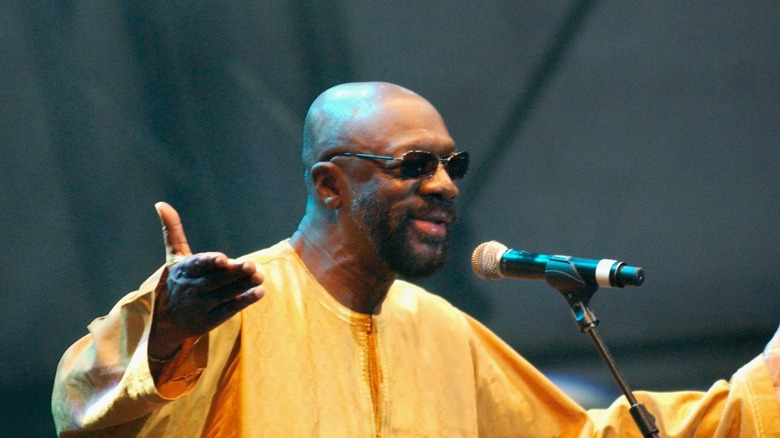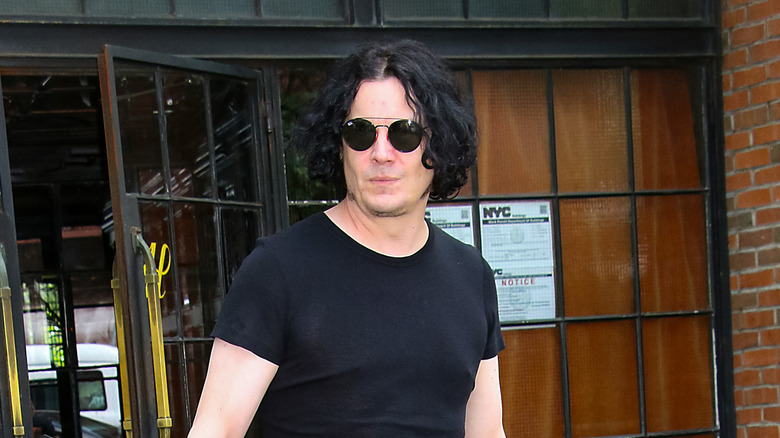All Of The Legal Trouble Trump Has Faced For Using Songs Without Permission During His Campaigns
There's nothing like a great song to liven up a crowd, but Donald Trump's use of music at his campaign rallies has been met with opposition on many occasions. For example, he found himself facing a potential legal battle against Beyonce over a 13-second video clip. As a source explained to Rolling Stone, Trump and his staff didn't have permission to use the song, "Freedom," in the clip. Celine Dion's camp has also spoken out about Trump's use of her iconic "Titanic" song, "My Heart Will Go On" posting on X, formerly Twitter, "In no way is this use authorized and Celine Dion does not endorse this or any similar use. ... And really, that song?"
As attorney Lawrence Iser explained to the Washington Post, "Trump is the greatest abuser of musical property rights, ever, in terms of people running for president," so it's no surprise that threatening social media posts and cease and desist letters from musicians are frequently making their way to his camp. However, although this negative attention is problematic in its own right, some artists have made good on their threats and filed suit against Trump for his unauthorized use of their music. Here, we'll break down the legal trouble he has faced for borrowing songs without permission at campaign rallies and other public events.
Neil Young settled with Donald Trump over the use of his music
From the start of Donald Trump's first presidential campaign, musician Neil Young was opposed to the real estate mogul using his music. In a 2015 statement shared by CNN, Young's management company said, "Donald Trump was not authorized to use 'Rockin' In The Free World' in his presidential candidacy announcement." Unfortunately, this did nothing to deter Trump and his campaign from playing Young's music, and the artist found himself in an ongoing battle. For example, according to Variety, Young called out Trump for using his music again in 2020, saying, "This is NOT okay with me" in two since-deleted tweets.
Later that year, Young finally had enough of hearing his music used at Trump-related events and filed a lawsuit against him. As court documents explain (via Daily Journal), the artist objected to the use of his music because of what he believed the campaign stood for. "[The] plaintiff in good conscience cannot allow his music to be used as a 'theme song' for a divisive, un-American campaign of ignorance and hate," the statement read. Court documents claimed that Trump's campaign staff repeatedly used the song "Rockin' in the Free World" without permission, thereby infringing on Young's copyright for the song.
Although the suit was the culmination of years' worth of frustration for Young, it was over in the blink of an eye; Young voluntarily dropped the suit in December 2020, just a few months after the original filing. As The Hollywood Reporter theorizes, Trump and his staff may have paid their way out of the suit.
Eddy Grant got his day in court against Donald Trump
When recording artist Eddy Grant released his smash hit, "Electric Avenue," in 1983, he likely couldn't have imagined how it would be used a few decades later. As BBC explains, 40 seconds worth of the song was used by Donald Trump's 2020 campaign without Grant's permission, playing in a video that was viewed 13.7 million times.
The singer filed suit the year the video was released but, unfortunately, faced a protracted court battle against Trump in which the president didn't admit any responsibility. In his deposition (via Copyright Lately), Trump even claimed that "Electric Avenue" was completely foreign to him. "Other than a very small piece [that] was played for me by my attorney," he said, "I had never heard of the song." He also claimed ignorance about who Grant was, saying, "I never heard of the gentleman bringing the lawsuit. Never heard of him."
Regardless of Trump's familiarity with the song, his campaign appropriated for the 2020 video, a federal judge decided in Grant's favor in 2024. As Grant's lawyer, Brian Caplan, explained to Business Insider, "Mr. Grant believes that the ruling will help other artists and owners of copyrights defend against similar infringement." Another of Grant's attorneys, Brett Van Benthysen, commented on how the final outcome of the lawsuit might unfold, including how Grant may be compensated for the infringement and his legal fees: "There will either be a trial just on damages, assumedly before a jury, or we could agree to a number without a trial."
Issac Hayes' family doesn't want his music to be associated with Trump
Writer, musician, and producer Issac Hayes built an incredible legacy, which his family sought to protect from any association with Donald Trump's presidential campaign. In February 2024, Newsweek reported that Trump faced accusations of using one of Hayes' songs without permission at the end of his speech at the Conservative Political Action Conference. Republicans Against Trump later shared a video on X, of Trump dancing to the song, "Hold On I'm Coming," and some users seemed convinced the president didn't have the right to use it. For example, one person commented (via Newsweek), "I hope he gets sued for using the music."
A few months later, Hayes' estate did indeed file suit against Trump for his use of the song. According to Variety, in August 2024 the family sought $3 million for the 134 copyright infringements they alleged Trump committed over the course of two years.
All artists should be properly compensated for the use of their work, but this lawsuit was also about something bigger for Hayes' estate. According to BBC, the producer's son, Issac Hayes III, explained his family's reasons for filing the suit while talking to reporters outside of an Atlanta courthouse. "We have to take a stand that we want to separate ourselves from someone with Donald Trump's character," he said. "This is not a political issue, this is a character issue." In September, CBS News reported that a judge ordered the Trump campaign to stop using the song while the lawsuit plays out.
Jack White isn't taking Trump's use of his music laying down
Most people have heard the White Stripes' incredibly catchy song, "Seven Nation Army," but Jack and Meg White weren't at all pleased to hear their hit tune being used as the soundtrack for a Donald Trump video clip. Like in many other situations, Trump and his campaign staff reportedly didn't get permission to use the song before making the video publicly available on social media, and the band quickly took legal action to rectify this issue. As The Guardian explains, Jack and Meg filed a copyright infringement lawsuit against Trump in September 2024 in response to the clip, which was posted just a month earlier by Trump staffer Margo Martin.
Jack didn't mince words when sharing his displeasure with the use of the song in a scathing Instagram post, promising to sue and calling Trump "scum." Days later on September 9, he posted a photo on Instagram of the lawsuit he and Meg filed along with the caption, "This machine sues fascists."
According to Vogue, the lawsuit's court documents also include a sternly-worded (albeit less inflammatory) opinion from the band members: "We vehemently oppose the policies adopted and actions taken by defendant Trump." The band's willingness to stand up for their intellectual property rights may inspire other musicians to take similar action when faced with this kind of copyright issue.
